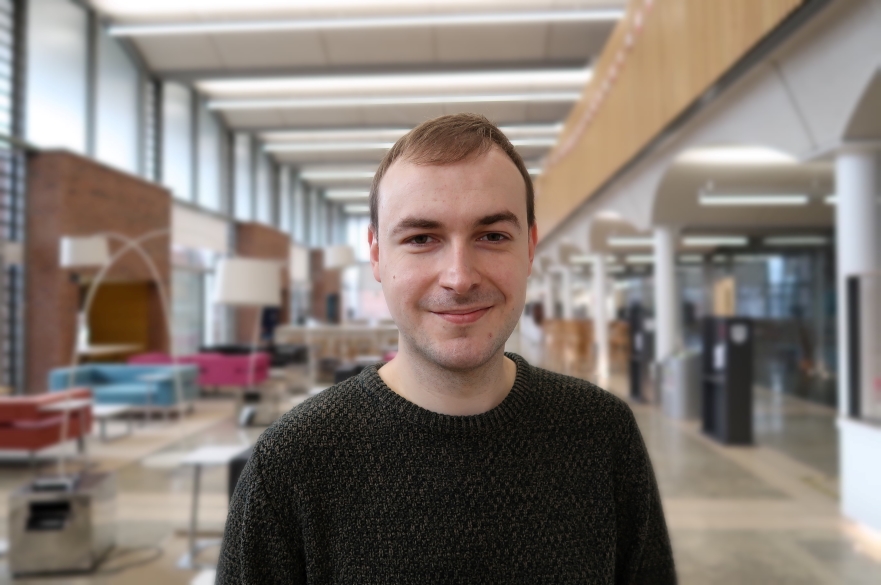Matthew Wright - Level 6 Healthcare Science Practitioner Degree Apprenticeship
Find out how a Level 6 Healthcare Science Practitioner degree apprenticeship helped Matthew become a registered biomedical scientist in the NHS.

Matthew Wright, 31, studied at NTU in 2008 prior to his apprenticeship and gained a Criminology degree before changing his career path. To progress further in his career from being an Associate Practitioner to a Registered Biomedical Scientist at the NHS, Matthew needed to have a science degree which seemed impossible to him at the time. Read more to see how a degree apprenticeship provided Matthew with the opportunity to pursue his career aspirations by studying towards a science degree.
Why did you choose to do an apprenticeship?
“I started working for the NHS as a Phlebotomist in 2015 and then moved into the Clinical Pathology labs in 2016 as a Medical Laboratory Assistant which involves pre-analytical admin duties. I worked in this role learning a great deal before progressing to become an Associate Practitioner in Clinical Pathology. Whilst I learnt a lot, I did have the desire to become a Registered Biomedical Scientist but this was impossible in my circumstances due to not having a science degree, working full-time, and being a homeowner - I was 28 when I started the apprenticeship. The Applied Biomedical Science apprenticeship has put me on the path towards meeting my career aspirations which would have been impossible otherwise. Learning on the job is also a big benefit for me as I get to earn a wage whilst studying.”
What stands out about Nottingham Trent University?
“I really like that our lecturers, particularly on the Applied Biomedical Science course, are experienced in the fields in which they teach. They have worked in the jobs we are training to do, so they are very good at preparing us for our future roles.
I also really like that NTU puts a big emphasis on sustainability, placing small things around the campus such as refillable water stations, discounts for using your reusable coffee cups, sustainable energy, allotments etc.”
I have developed within my role massively over the past four academic years. I had very little science knowledge at the start so learning about the various disciplines and the science behind them has been amazing.
How do you believe this apprenticeship will affect both your current job role and future career?
“I have developed within my role massively over the past four academic years. I had very little science knowledge at the start so learning about the various disciplines and the science behind them has been amazing. This knowledge has made me a better practitioner with a broad understanding of how the multi-disciplinary departments and teams within the hospital join up to provide the best patient care.
I hope to apply the knowledge I have learnt both from NTU but also the workplace into passing my verification and degree (to become a Registered Biomedical Scientist). I then hope to continue my journey to become a Higher Specialist Biomedical Scientist in Haematology.”
What do you think the facilities available at NTU?
“You really couldn’t ask for more! The online library resources are amazing as are the library staff. If there’s a journal you can’t access, they will get access for you promptly. The labs at NTU are fantastic, especially the Rosalind Franklin Building, and contain much of the equipment you will find in a real diagnostic laboratory. Clifton Campus especially has such a sense of community and all the facilities you’d want for a day at university like restaurants, cafes, shops, and the Students’ Union bar.”
What skills and experience have you gained as part of this apprenticeship?
“I have gained a lot of manual laboratory skills including the preparation and staining of peripheral blood smears for microscopy. I have also had many opportunities to review rare and obscure cases with trained morphologists and consultants at trust level Multi-Disciplinary Team meetings which has given me great insights into the processes that occur to come to a diagnosis for a patient. I have gained extensive mechanical and troubleshooting skills from working with a range of automated analysers daily.”
What is your favourite thing about your apprenticeship?
“Being able to get hands on in the field that I am training within. I have seen some really interesting cases working in a very busy diagnostic Haematology department. I have played a key role in identifying and diagnosing many diseases and disorders ranging from Malaria through to Acute Myeloid Leukaemia. This brings a great sense of satisfaction that I have had a direct impact in enabling a patient to get the best care to help treat their condition. Additionally, the lab sessions at NTU which give me an insight into what occurs in other disciplines that I have not worked in, such as Histopathology.”
To learn more about our apprenticeship courses, please contact apprenticeships@ntu.ac.uk.